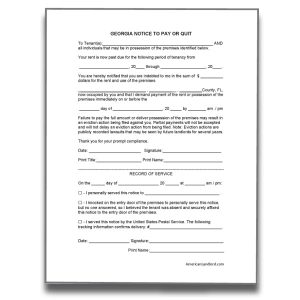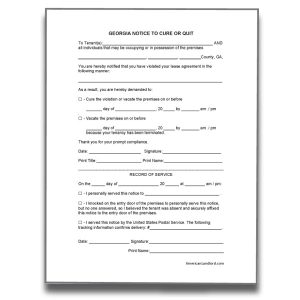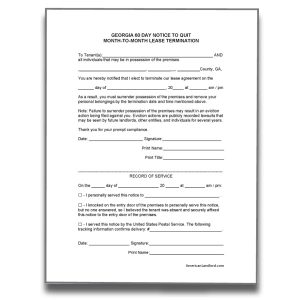Georgia Eviction Process
In Georgia, evictions are called dispossessory proceedings and the information on this page applies only to residential rental property, not commercial or agricultural real estate which may have entirely different proceedings.
1. Prepare the termination notice. There are three types of notices a landlord can use to begin the eviction process in Georgia:
- Georgia Notice to Pay or Quit (For nonpayment of rent)
- Georgia Notice to Cure or Quit (For violations other than nonpayment)
- Georgia 60 Day Notice to Quit (For month-to-month agreements)
2. Serve the tenant. A landlord must deliver the notice to the tenant and inform them of the violations. A landlord then has the right to immediately file for eviction unless they gave the tenant an opportunity to cure the noncompliance.
3. Dispossessory action is filed. If the tenant fails to cure the noncompliance or vacate, the landlord must file a dispossessory affidavit with the local magistrate court. This document requires the tenant’s name, address, and reason why the landlord is filing it.
4. Dispossessory warrant is served. The tenant will be notified of the filing and given up to 7 days to respond with an answer.
5. Writ for possession. If the tenant submits an answer, a court date will be scheduled to hear testimony from both sides. But if the tenant doesn’t respond, the landlord may petition for a writ for possession to have the sheriff escort the tenant of the property.
Notice to Quit
A Notice to Pay or Quit demands a tenant to pay the total amount of past due rent or vacate.
-
Original price was: $12.95.$9.95Current price is: $9.95.
A Notice to Cure or Quit may be used if a landlord wants to either allow a tenant to become compliant or ust terminate the lease.
-
Original price was: $12.95.$9.95Current price is: $9.95.
A 60 Day Notice to Quit is required for a landlord to cancel a month-to-month rental agreement.
-
Original price was: $12.95.$9.95Current price is: $9.95.


